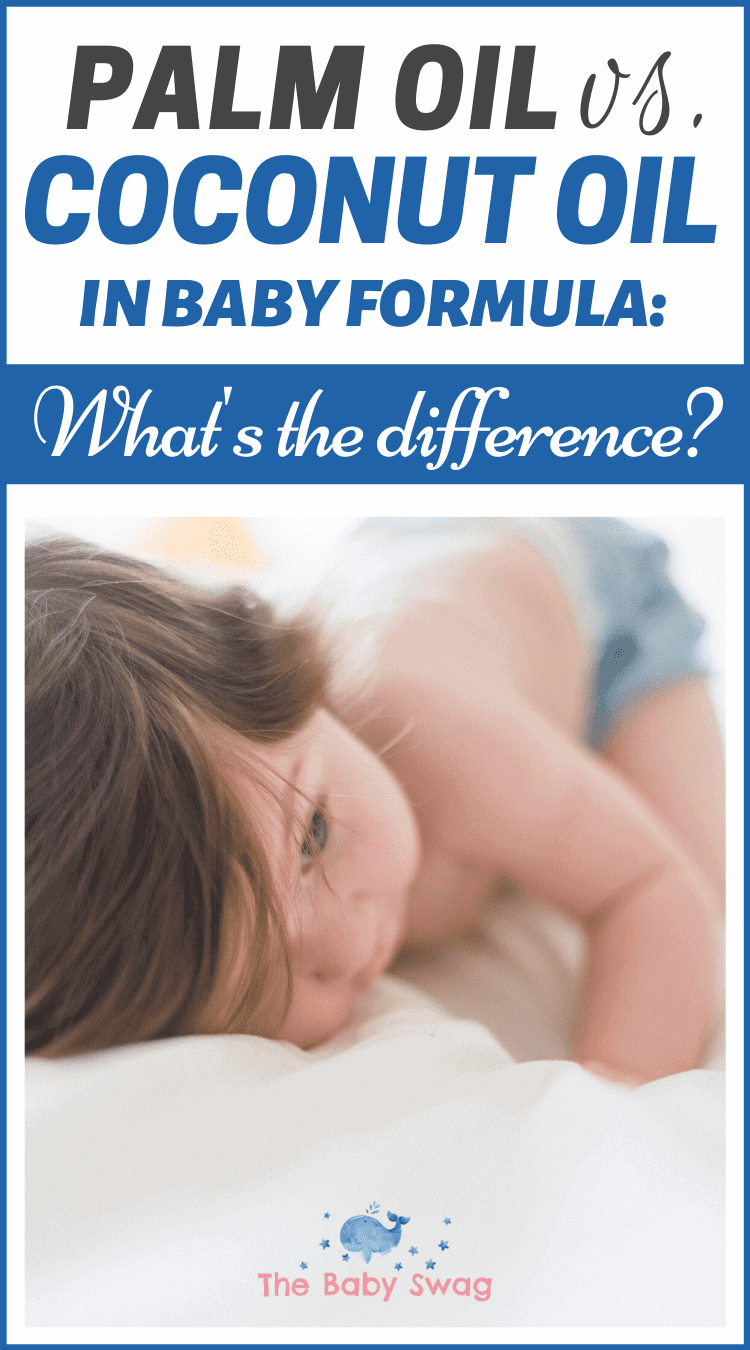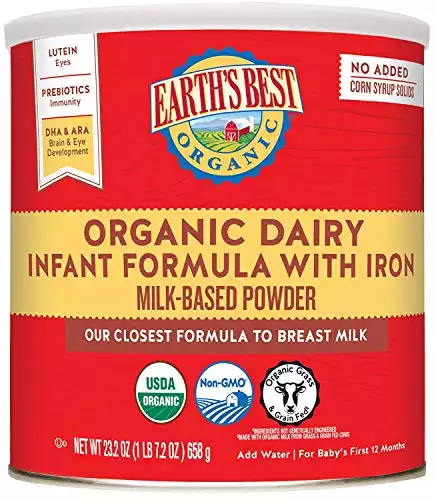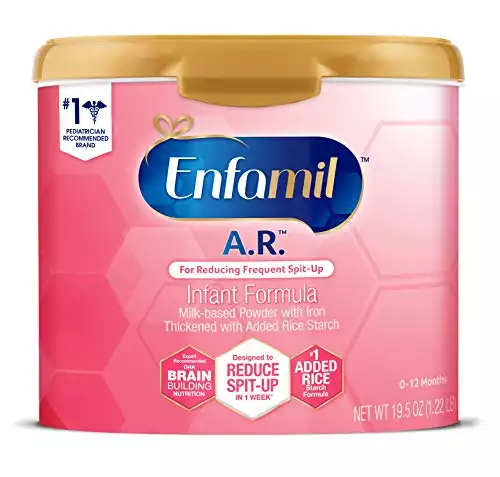- How to choose baby formula - September 4, 2023
- Best amino acid-based formulas 2024 - September 4, 2023
- Best hypoallergenic formulas 2024 - August 30, 2023
A certain amount of oil must be added to baby formulas in order to make the product resemble breast milk. Some companies include coconut oil in their infant blends while other manufacturers choose to use palm oil. There even are producers who add a mixture of palm and coconut oils in the formula.
On the one hand, some say that vegetable oil is good for babies, especially olive oil and coconut oil. They contain fatty acids which are important nutrients for a child’s development. On the other hand, others say that these oils are bad for all of us because they contain saturated fats which increase cholesterol.
The most controversial of all is palm tree oil. But are these compounds good or bad when added in baby formulas? It’s hard to state with a straight-up answer but I’ll do my best to offer you an objective analysis of both coconut and palm oil, in terms of benefits, negative effects, and more.
Jump to a specific section
- Main Differences between Palm Oil vs Coconut Oil
- Palm Oil vs Coconut Oil – Product Information
- Palm Oil vs Coconut Oil – Benefits
- Palm Oil vs Coconut Oil – Potential Harmful Effects
- Popular Infant Formulas that Contain Palm Oil
- Popular Infant Formulas that Contain Coconut Oil
- FAQ’s for Palm Oil and Coconut Oil
- Palm Oil vs Coconut Oil in Baby Formula – Bottom Line
Main Differences between Palm Oil vs Coconut Oil
The Main Differences Between Palm Oil vs Coconut Oil are:
- Palm Oil comes from the palm fruit’s pulp, whereas Coconut Oil is sourced from the mature coconut fruit’s meat or kernel
- Palm Oil comes from palm trees grown mostly in Indonesia and Malaysia, whereas Coconut Oil is produced in large quantities in the Philippines.
- Palm Oil contains a lot of saturated fats that solidify when stored at room temperature, whereas Coconut Oil is better absorbed by the body and it’s used as a medical remedy.
- Palm Oil is less expensive, whereas Coconut Oil is also considered healthier.
Palm Oil vs Coconut Oil – Product Information
Palm Oil

This oil is sourced from the palm tree, more specifically, from the tree’s fruits. Nowadays, the production of palm oil has increased significantly. Although it is added in a lot of foods, this oil has led to multiple controversies regarding its level of health. More and more people seem to believe that this ingredient leads to negative effects on the body. The palm that produces this oil is located in areas such as Africa and Asia, in countries like Malaysia and Indonesia.
Plenty of industries use it as one of their main compounds when it comes to food, baby formulas, and even cosmetics. One oil tree will provide a higher quantity of oil compared to the ordinary sunflower (up to eight times more).
According to the WWF experts, half of the products available on the market that are sold in packages contain this type of oil. However, recently, nutritionists and health specialists expressed their concern regarding the usage of palm oil, especially in baby formulas.
Bow how can a harmful ingredient be added in a product that’s supposed to help and support infants to grow and develop? As far as we know, these products target a sensitive and vulnerable public: new moms and their children. Therefore, all producers claim they closely supervise the manufacturing process. According to them, formulas must pass multiple clinical trials and tests in order to receive a proper certificate and then be released on the market.
In reality, both the benefits and the potential harms of palm oil are still discussed and questioned. No one seems to really know for sure if this element is good or should be completely banned. Even the studies conducted in the last couple of years haven’t shown any conclusive results. Still, parents continue to worry and they need to clarify this issue, for their peace of mind.
Coconut Oil

This oil is sourced from either the meat or the kernel of coconuts. Only mature coconut fruits that are harvested from the palm tree and are suitable for oil collection. It is rich in high-saturated fat and it’s resistant to rancidification, which means it can last a long time without going bad. Unlike palm oil, coconut oil is less controversial and used in a wide variety of things, from cosmetics to recipes and baby formulas.
There are several different types of coconut oil:
- Unrefined organic coconut oil – this is the best choice and it comes with the majority of the benefits that coconut oil can provide. It comes from fresh coconut fruits through a wet-milled fermentation process. This method maintains all the good properties of coconut. Moreover, unrefined coconut oil contains a high amount of antioxidants;
- Extra virgin coconut oil – this might be the best choice in the case of olive oil but when it comes to coconut, the “extra virgin” type might not the ideal. Why, you may ask?! Well, this oil is obtained through cold-pressing which fails to preserve essential compounds like antioxidants;
- Refined coconut oil – this oil goes through several different processing steps, being bleached, heated, and deodorized. Therefore, it lacks both smell and taste. Although there are a few healthy alternatives out there, refined oils are not as safe and beneficial as their unrefined counterparts;
- Fractionated oil – fractionated is also known as MCT oil and it has a liquid consistency that won’t get solid that easily. It contains a lot of brain-boosting fats but it lacks some other properties that unrefined oil has.
Palm Oil vs Coconut Oil – Benefits
Palm Oil
Before diving into some of the reasons why palm oil could be bad for your baby, let’s consider several advantages of including this compound in infant formulas. Apparently, it could play an important and nutritious role in your newborn’s development. Here are the main advantages of palm oil:
- It contains a lot of vitamin E in the form of tocopherol, which prevents cancer by fighting against free radicals;
- Contains 15 times more vitamin A than carrots which are known for improved eyesight;
- Palm oil is easier to digest than milk fat;
- This oil leads to a very good formula consistency that resembles breast milk a lot;
- It has anti-thrombotic properties. Simply put, it prevents the formation of blood clots;
- Is rich in antioxidants which support a powerful immunity. Moreover, balances the body’s cholesterol levels as long as it’s used in moderation;
- Provides Omega-3 fatty acids which sustain a lot of the body’s functions.
Coconut Oil
Coconut oil is a much more popular alternative to palm oil. Most people perceive it as a healthier and safer version. Here are some of its benefits:
- This oil contains fatty acids which are said to provide medicinal properties such as supporting good cholesterols while also lowering the risk of cardiovascular diseases;
- Several studies have shown that people who include coconut and coconut oil in their diets have higher chances of having a healthy life;
- It can kill dangerous microorganisms. Coconut oil contains a lot of 12-carbon lauric acid which, when digested, forms a compound that’s known as monolaurin. These substances can help the body eliminate dangerous pathogens like viruses, bacteria, and fungi;
- Coconut oil promotes healthy teeth, skin, and hair;
- It boosts brain function and might prevent certain health conditions such as Alzheimer’s.
Palm Oil vs Coconut Oil – Potential Harmful Effects
Palm Oil
- Contains LDL cholesterol which is unhealthy and potentially harmful for the heart;
- According to certain experts, palm oil consumption might lead to slower calcium absorption. So, your child’s organism will not retain all the amount of calcium that it needs. This is important because infants truly need this mineral in order to develop strong bones;
- Sometimes, palm oil can lead to hardened stools, which for a small child, can be a pretty serious issue;
- Too much palm oil creates blockages in the blood vessels and increases cholesterol levels.
Coconut Oil
- Although this oil is usually safe to consume, even for babies, sometimes it may cause diarrhea or other digestive problems;
- Despite its antibacterial properties, coconut oil might make the symptoms of autoimmune disorders worse;
- There were cases in which this oil was linked to high cholesterol;
- If your baby is sensitive, this oil might give him or her a nasty allergic reaction.
Popular Infant Formulas that Contain Palm Oil
Organic Infant Formula by Plum Organics
This formula made by Plum Organics might be an organic formula but that doesn’t mean it’s free from potentially controversial ingredients such as palm oil.
Other than that, it seems a pretty good and safe product. The company prides itself on using non-GMO substances. It’s free from corn oil and syrup and maltodextrin. Nevertheless, the blend contains ARA and DHA but there, despite being a tad controversial, are said to promote eye and brain development.
Organic Non-GMO Infant Formula by The Honest Company
This blend is easy on your baby’s stomach and it is meant to alleviate issues like gas and fussiness. It does contain palm oil, soy oil, glucose syrup, maltodextrin, and coconut oil, but all of them are organic. Besides these ingredients, this baby formula also comes with vitamins, minerals, healthy fats, and proteins.
The milk protein comes from cows that are raised without antibiotics or growth hormones. The blend is carefully created to mimic breast milk as much as possible.
Popular Infant Formulas that Contain Coconut Oil
Earth’s Best Organic Formula
This is a popular infant formula that contains plenty of nutritious ingredients that support your baby’s growth. It’s an organic product that’s free from corn syrup solids and it resembles breast milk quite a lot. Moreover, it contains prebiotic fiber which boosts immunity. It’s true that this formula is quite expensive but it’s a tasty and healthy choice.
Besides coconut oil, Earth’s Best Organic Formula also contains nonfat milk and sunflower oil. It’s easily digested by your baby’s stomach and the powder dissolves quickly without the need to shake the mix too much.
Omega 3 DHA and Omega 6 ARA fatty acids naturally found in breast milk to support brain and eye development, Iron for healthy development.
Enfamil A.R. Infant Formula
This is a special kind of formula that prevents spit-ups. It alleviates the symptoms of reflux problems as well as other digestive issues due to its prebiotic content. It’s a thicker blend that it’s said to solve acid reflux.
Due to its safe ingredients, it appears that this particular formula doesn’t cause constipation or bloating which are two very common issues when it comes to baby formula consumption. Enfamil A.R. promotes a healthy brain and a boosted immune system. Among its ingredients, there are plenty of nutritious elements such as minerals, vitamins, protein, coconut oil, and more.
| Palm Oil | Coconut Oil | |
| Extracted from | Palm fruit or pulp | Matured harvested coconuts |
| High presence in | Asian countries, Latin America, and Africa | Thailand, India, Philippines, and Sri Lanka |
| Health benefits | Fights against free radicals but its consumption might lead to certain health problems. | Prevents liver conditions, treats a wide range of health conditions and helps in diabetes. |
| Types | Refined, deodorized, bleached, and red palm oil (the last one is the healthiest). | Refined, organic, virgin, pure, extra virgin, organic virgin. |
Even though BOTH options are great we chose the Enfamil Baby Formula as a slightly better option which is ideal for babies who are otherwise healthy, whereas Similac would be better for babies that have health or other developmental issues.
FAQ’s for Palm Oil and Coconut Oil
Yes. Coconut oil is safe for breastfeeding babies since the oil promotes healthy inflammatory balance and has Vitamin E which benefits the body. Breastfeeding moms should definitely include coconut oil in their diets, that is, at least 3 tablespoons per meal.
Yes. Coconut oil helps mom increase their milk supply, and not only that but the increase of lauric acid and capric acid thanks to the coconut oil, provides babies with even greater protection, so moms should use it every single day.
Palm oil is a source of fat in baby formula and it is used to achieve the palmitic acid levels that are similar to human milk. So far, there is no evidence that shows that palm oil should be avoided in formulas, which is why many companies are using it.
Palm Oil vs Coconut Oil in Baby Formula – Bottom Line
Both oils have advantages and disadvantages. Some countries use more palm oil while others consume coconut oil more.
It’s true that palm oil is surrounded by a lot of controversies but, on the other hand, there are a lot of potential health benefits regarding coconut oil consumption, although not all of them were proven by science. All in all, I personally think, you should try to avoid formulas that contain palm oil and choose those with coconut oil instead.










Leave a comment